Human Resources
Funai Soken Consulting Group Basic Policy on Human Resources
The Funai Soken Holdings Board of Directors established this Basic Policy on Human Resources on April 21, 2021, to communicate to stakeholders our stance toward human resource matters, which we have identified as a high-materiality issue.
The Thinking Behind the Policy
We at the Funai Soken Consulting Group recognize the importance of people as the very means by which we create value as part of the global effort toward sustainability. To that end, attracting and retaining talented people is a top priority in our quest to deliver real value to the world.
Basic Policy
-
-
1. Diversity & Inclusion
To maintain the diverse workforce needed to consistently deliver value to an increasingly diverse world, we are committed to welcoming people of all nationalities, genders, and ages to our workforce, and encouraging mutual respect for different ways of thinking. -
2. Creating Opportunities for Growth
We are committed to maintaining an extensive, robust training regime, not only to arm our workforce with the skills to drive the innovation the times demand, but also to help make a better society by generating more opportunities for sustainable growth. -
3. Better Employee Engagement
We seek to improve employee engagement so that working at the Funai Soken Consulting Group leads to personal and professional growth, and improved teamwork based on shared values, thus creating a positive cycle that not only benefits our people and the group’s business, but that is also conducive to finding solutions to the issues facing society today. -
4. Healthy Management
Not only are we striving to make the Funai working experience more flexible and diverse, but we also offer steadfast support for a better quality working environment so that employees can pursue the rewarding work of improving client satisfaction and creating value for society. -
5. Transparency Regarding Human Resource Initiatives
We will disclose information regarding the progress of initiatives implemented under this policy as is appropriate in our ongoing relationship with the community. -
6. Compliance
Compliance is more than just adhering to the law. When it comes to the vast array of interactions with stakeholders across our business activities, we are committed as much to fairness in light of social norms as to legal correctness.
Instituted: April 21, 2021
Takayuki Nakatani
President and CEO
Funai Soken Holdings, Inc. -
Human Resources Management
At the Funai Soken Consulting Group, we believe that a diverse workforce is key to sustained growth.
Knowing the importance of securing sufficient talent and worker mobility, we are working hard to attract and retain good people by strengthening our talent management. Initiatives include aggressive hiring and training to maximize employees’ skills.
HR Strategy
We will strive to increase the number of consultants—i.e., employees with a direct bearing on sales—by an average of 10% per year.
We are also investing aggressively in key initiatives such as hiring, training and career development, and retention.
*1. Funai Consulting’s target is an average annual salary of ¥10 million for consultants by 2030, and the company is striving for constant increases in starting salary and compensation rates to that end.
Major Human Capital Initiatives
| KPI | Target | |
| Hiring | Proactive hiring of consultants—i.e., those with direct bearing on performance. | Consultant headcount: 1,150 by 2025 (1,018 in 2024) |
| Professional development | Hours of training per employee | 100+ hours of training per employee per year |
| Retention, career development | Improve consultant compensation | Avg. annual salary of consultants at Funai Consulting: ¥10 mil. by 2030 (*see note above) (¥7.8 mil. in 2024) |
| %age of management positions held by women | 25% by 2025, 30% by 2030 (24.1% in 2024) |
Hiring
We are hiring aggressively to grow our workforce to 1,800 by the end of 2025,including more new graduates to boost consultant numbers for upstream processes, and mid-career recruits in our high-growth DX and M&A businesses. We also intend to enhance our management-level workforce in order to reinforce operations groupwide.
-
Mid-career
We seek to secure more talent through broader recruitment channels and streamlined screening processes.
Hiring professionals is a particular focus; for instance, given that our ability to attract digital transformation staff has a direct bearing on the bottom line, we have launched a dedicated recruitment webpage for this purpose.
Meanwhile, recent years have seen an increase in the re-hiring of Funai alumni. This, too, is an effective way of securing a broad range of professional talent. -
Recent Graduates
In addition to industry-specific recruiting, we also hold wholegroup digital transformation hiring events and offer digital transformation internships (featuring workshops and forums) to approach students early on. In doing so, we identify the pool of available talent, differentiate ourselves from rival employers, and lock in potential employees.

Internships
The Funai Soken Consulting Group offers internships for prospective new-graduate hires.
Since 2012, we have offered two kinds of internship: short (three days or one week) and long (three months or more).
These allow students who are about to begin their job search a real understanding of our work and the workplace atmosphere.
In the 2024 internships, we hosted some 2,845 students who will enter the workforce as new graduates in 2026.
Professional Development Programs
We offer a variety of training programs. Some are tailored to different levels of employees (e.g., new hires, mid-career hires, experienced staff, and upper management); others are designed to develop specific skills or address specific problems. Our focus is on having the right skills at the right time, instilled through practical work based on real examples rather than theory alone. In the consulting segment, we list up the digital transformation skills needed to get results, and devise training content for each skill. Linking these with career enhancement programs is a p ositive way for us to develop every employee’s skills and steadily develop a pool of staff with digital transformation skills.
Some employees undergo training that incorporates external content in order to acquire more specialized skills.

-
DX Training
We have training, workshops, e-learning, and other programs in place at group companies to develop work-ready digital solutions staff.
Funai Consulting offers a total of 22 DX training courses that systematize the skills required to produce quality results, and provide the instruction to instill them.Linking skill acquisition progress with actual performance outcomes not only drives the evolution of training content but ensures implementation of the PDCA cycle.
-
Consulting training
We offer a total of 1,014 training courses that instill applicable skills that enable consultants to assist clients on their way to improved business performance.The training emphasizes on-the-job practice, translating educational “input” into practical “output” in the workplace, with KPIs based on bottom-line results.
-
Hours of training per employee in 2024
・92.8
*Includes participation in training, new-recruit consultants accompanying colleagues on client visits, and attendance at events held to promote the embedding of corporate management policy. The total number of these hours is divided by consolidated employee headcount to calculate the average number of hours.
OJT: Accompanying Senior Colleagues on Sales Calls
In addition to extensive training programs, we place a particular focus on on-the-job training—especially accompanying senior colleagues on sales calls. Having first-year employees experience sales calls instills practical knowledge of the key points and skills.
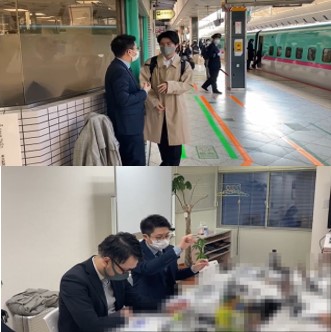
Photos: A day in the working life of a Funai Consulting consultant. (Students about to start job hunting take note!)
Better Management Training Programs
We recognize that managers’ ability to train their staff and lead their organizations directly affects KGI performance and corporate growth, which is why we are building new, improved management training programs.
-
Career Enhancement Program
Employees who seek promotion to higher ranks can undergo training to learn about the required roles, skills, and mindset. These programs are provided through in-person classes, e-learning, and assignments. -
Upper Management Training
Middle management employees can deepen their knowledge and skills through a variety of training, including workshops, executive reviews, subject-specific committees, and “vision meetings.”
Evaluation
At the Funai Soken Consulting Group, our HR framework comprises three systems: rank, evaluation, and compensation.Our HR strategy is designed to put the Group Purpose into practice.
The ranking system lays out a variety of career paths, and provides a clear picture of the roles required of each employee and the steps they can take to achieve growth.
The evaluation system rates employees not only on results, but also the processes and actions taken to achieve them (e.g., practical application of the Funai Way). By delivering fair, broad-ranging evaluation and careful feedback, the system offers steadfast support for employees who seek growth.
Employees’ evaluation outcomes are reflected appropriately in their compensation so as to realize a system of fair distribution in accordance with contribution. There are ample opportunities for those who wish to change their career course, thus affording employees the flexibility to pursue careers that suit their own vision and stage of life.

Through these systems, we aim to strike a balance between maximizing each employee’s lifetime value and the group’s sustainable growth. We strive to do this by empowering employees to apply their skills, grow, and contribute to their company in a variety of ways. We will constantly strive to keep our HR framework fine-tuned for optimal efficacy through ongoing improvements.
Ranks: Laying Out the Steps Needed to Achieve Growth in a Variety of Career Paths
Our ranking system is designed to clarify what is expected of employees; it sets out pathways to individual growth by defining skills, roles, and duties for different career courses and ranks, as well as the rules and criteria for promotion and other career advancements.
There are six ranks, which are based on the expected abilities, contributions, and achievements (some career courses may differ). Within these, individuals’ authority, responsibilities, and compensation are determined according to the roles and capabilities required of them.
There are many paths to career advancement at the Funai Soken Consulting Group in accordance with factors such as an employee’s role and the area of our business they work in. Major courses include a management course for organization leaders and a specialist course for those who want to pursue expert skills, as well as a consulting development course, a business development course, a corporate professional course, and a corporate staff course.
These courses are designed to enable employees to seek personal and professional fulfillment, and to build a long-term career based on sustainable growth. The rank system is configured to allow employees to switch career paths in response to changes in personal vision and stage of life. A defining point of the rank system is that it is not a “career ladder,” where if you’re not going up you’re going down; perhaps a better climbing metaphor is a jungle gym, where there is room to explore in all directions.
Evaluations: Promoting Growth through Equitable Measurement of Contribution
Our evaluation system rates employees based on how well they embody the employee ideals defined in the ranking system. Employees are assessed against specific targets across a predefined time span. In this way, the system not only encourages them to meet targets, but also promotes growth through the process of striving toward those goals. This system makes sure that diverse forms of contribution are evaluated fairly and appropriately, and are reflected in compensation. In that sense, evaluation is much more than just a way to determine salary; it is a vehicle for promoting growth through professional development, processes, and feedback.

Evaluation is typically carried out as a one-year cycle of setting targets, working towards them, undergoing evaluation, and getting feedback, but the cycle may differ within the group from company to company.
Evaluation involves a multi-stage process, which begins with self-assessment, followed by evaluation by supervisors, adjustment of individual performance rating in accordance with the whole department’s performance, and assessment by the Evaluation Council, before a final decision is made. Management-level employees undergo 360-degree assessments for a more all-round evaluation. Client feedback is also taken into consideration, thus making evaluations more objective. Thus, by incorporating multiple perspectives, we seek to correct for biases that may creep in to evaluations are thereby boost buy-in from employees. Employees learn the final decision regarding their evaluation at one-on-one feedback sessions with their supervisors. Not only does this ensure transparency, but it also serves as a forum to praise employees for the work they have performed, lay out what’s expected of them in the next cycle, and establish specific actions that may be required. In this way, these one-on-one feedback sessions are oriented toward growth and solutions.
To help employees achieve the growth they seek, we offer attentive, individualized support through regular one-on-one meetings in addition to the aforementioned evaluation feedback sessions, so as to offer ongoing feedback on day-to-day work.
Evaluation Criteria
Evaluation criteria are set in accordance with company targets and individual roles. Major criteria include the following.
Outcome Targets
- Achievement of individual targets
- Achievement of departmental targets
- Launch of new solutions, businesses
- Seminar attendance
- Workshop membership
- Consulting quality (e.g., consulting contract renewal rates, NPS)
- Staff turnover rate
Process Targets
These assess the processes and specific action plans put in place with the aim of achieving outcome targets.
Action Targets & Competencies
- Understanding and application of the Funai Way
- Self-management
- Teamwork
- Compliance
- Business manners
The evaluation system rates employees not just on results, but also on the processes and actions taken to achieve them. It places particular emphasis on practical application of the values encapsulated in Funai Way. These are adventureship (converting change into momentum and contributing to the whole group’s activities), empathy (being a reliable partner for clients and business owners), and integrity (keeping promises and being a force for good). In addition, Funai Consulting Shanghai has an extra criterion: embodying their core values of “I love the company, I love my work, and I love my colleagues.”
Compensation: Fair Distribution in Accordance with Contribution
The compensation system is designed to encourage good conduct; as such, employees’ compensation is determined in accordance with rank and based on evaluation. Compensation is made up of two parts: a fixed portion, which includes basic salary and allowances, and a floating portion, i.e., bonuses.
Monthly Salary
Monthly salary is determined in accordance with rank and pay grading within each rank on the salary table, as well as various allowances. An employee’s pay grading on the salary table changes in accordance with evaluation outcomes (i.e., appraisals and total evaluation score). Changes are reflected starting with their next month’s salary.
Bonuses
Bonuses are paid in accordance with the company’s performance and individual evaluations. Typically, summer bonuses are based on the company’s performance (i.e., calculated by applying a factor that reflects performance) and individuals’ base salary, and winter bonuses are based on company performance and individuals’ evaluations and appraisals.
Allowances
Work-based and position-based allowances
Paid in accordance with rank and career course
Qualification allowances
Help for employees to acquire certain qualifications
Family allowance
Paid to those with dependent family members
Commutation allowance
Reimbursement of actual expenses
Overtime allowance, late-night allowance
Paid to those who work overtime
Adjustment allowance
Paid in accordance with changes in wage structures, etc.
Systems to Support Diverse Working Styles and Career Building
We are devoted to empowering our people to achieve sustainable career growth. To that end, we have systems in place to support diverse working styles and career building.

Career Course Changes
This system is designed to enable employees to switch between career courses (e.g., from the management course to the expert course) for better alignment with their skills and preferences, or with the organization’s circumstances. To change career courses, an employee states their request to their supervisor, who then submits a formal request to a committee of corporate officers for deliberation and decision. When an employee changes career courses, their monthly salary is determined by taking their pre-change salary and adjusting it according to the salary table for their post-change course.

Interdepartmental Transfers
It is also possible for employees to seek transfers to different departments without changing their career course. This can be arranged through the in-group transition system and the in-group job offer system, as well as normal personnel transfers. Our aim is to enhance individual value and management skills by enabling employees to gain experience in multiple fields according to their wishes. The in-group transition system lets employees apply to transfer to a department they’re interested in, while the in-group job offer system lets them apply for internal job openings. In contrast to the career course change system, these systems don’t require employees to go through their supervisors; they can consult directly with the Personnel Department.

Budgeting and Evaluation Adjustments for Employees Caring for Children
We also offer budgeting and evaluation adjustments to alleviate the effects of absence due to childbirth and childcare leave. Under this system, when an employee takes childbirth or childcare leave (either for their own pregnancy and childbirth or for their spouse’s), the budgets they have already been allocated are transferred to the department or company as a whole. By enabling employees to take leave without undue worry that their allocated budget may be revoked and therefore the potential benefits lost to their department or company, this system is just another way in which we offer support for employees at various stages of life.
Our View on Career Building
We are devoted to empowering our people to achieve sustainable career growth. To that end, we have systems in place to support diverse working styles and career building.
The Career Ladder Is Out; the Career Jungle Gym Is In
A defining point of our career building initiatives is that they do not constitute a “career ladder,” where if you’re not going up you’re going down; perhaps a better climbing metaphor is a jungle gym, where there is room to explore in all directions. This way of thinking allows employees to choose career paths flexibly according to their own aspirations and stage of life, for instance by switching career courses from the management course to the specialist course, or by transferring to another department. These systems reflect our HR philosophy, which emphasizes balance between maximizing each employee’s lifetime value and the group’s sustainable growth.
Seeking Professional and Personal Fulfillment
Achieving sustainable career growth requires a balance of professional and personal life. We offer a variety of working options that offer flexibility around various life events, and place importance on maintaining environments where employees can forge meaningful careers over the long term.
Opportunities for Ongoing Growth
We strive to assist employees in their quest for ongoing growth, for instance by providing regular feedback as part of our evaluation system, as well as varied career paths. We do this because we believe that individual growth generates company growth.
Sharing Values
We think it is important that our people should practice—and share—the values advocated by the Funai Way. By reflecting this in personnel evaluations, we strive to foster a group culture and set clear guidelines for individual conduct.
Retention
Initiatives to Improve EVP
-
To benchmark our efforts surrounding employee satisfaction, improving our Employee Value Proposition (EVP) score is now an HR strategy KPI in our Mid-Range Business Plan.

・Revitalizing communication through the integration of the group's Tokyo Headquarters into a single office
・Continuous increases in compensation
・Maintaining robust personnel and performance assessment systems that help employees pursue diverse career paths, such as flextime, remote work, and course changes.
Ingraining the Group Purpose
-
Town Hall Meetings
Group CEO Takayuki Nakatani and management from group companies held a series of town hall meetings to speak directly with employees about the Group Purpose, its background and intentions, and to answer their questions about it.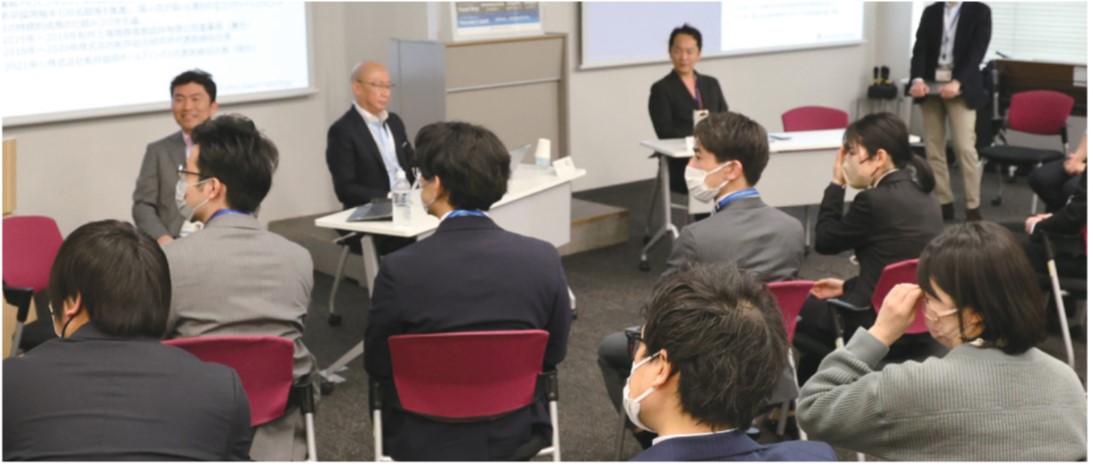
-
An Often Overlooked but Potent Force for Good
We have always believed that properly voiced greetings have the power to encourage, invigorate, and console. This is reflected in our office culture, where it is common practice for employees to gather and greet arriving colleagues—a bright and cheery start to the working day.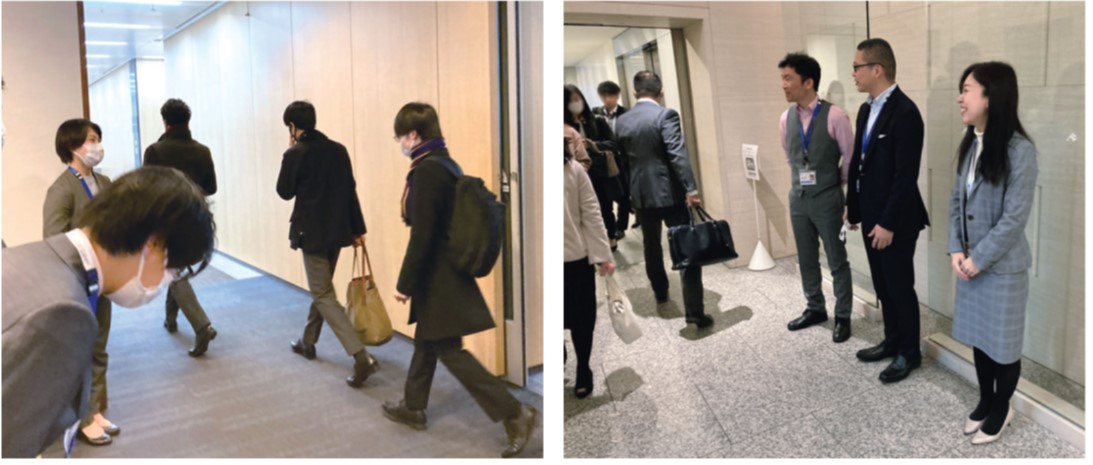
-
The Founder’s Spirit Lives On
To ensure the spirit espoused by Yukio Funai remains ingrained throughout our workforce and operations, future leaders from throughout the group participate in workshops and lectures, tour the Founder's Memorial Museum, and spread the word among our organization.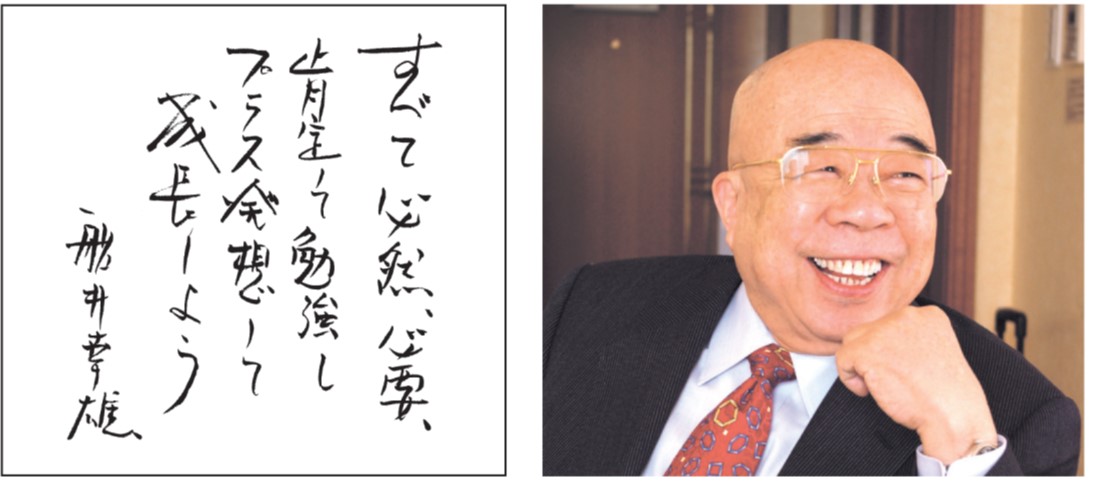
Promoting a Distinct Group Culture
Hometown Groups
Because our workforce comprises people from all around Japan, informal “hometown groups” of people from the same prefecture are an effective way of promoting communication and team spirit outside of hierarchical and departmental demarcations. The hometown groups have already proved successful, with some 600 employees taking part.
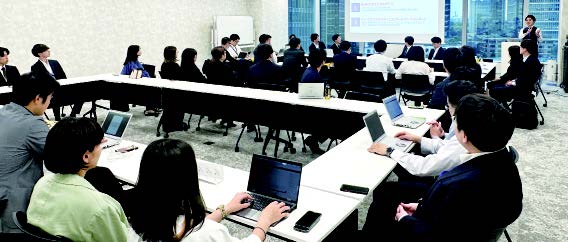
Our Business as a Vehicle for the Greater Good
High-Materiality Issues
●We contribute to our communities through consulting services for mid-scale businesses and SMEs

●We offer support and solutions to help clients implement ESG management

How This Relates to Our Business Strategy
●We offer mid-scale and SME clients industry-specific, growth-phase-appropriate consulting services, delivering long-term support from early growth through to maturity and exit.
●We contribute to our communities through consulting services designed to propel client companies to the ¥10 billion turnover mark.
Giving Back to the Community through Endowed Courses
-
Between October 2023 and January 2024, Funai Consulting held an endowed course at Kobe University on growth strategies and performance improvement at mid-scale companies and SMEs.
The course was conducted by seven Funai Consulting consultants, who explained how to build a company that can achieve sustainable growth amid severe environmental changes and constant demand for solutions to the various challenges society faces. Students powered over a rich supply of case studies, and discussed their different growth strategies and methodologies for boosting business performance.
Coming Soon
-
Funai Consulting Teams Up with Kobe University for Joint Research on Value Creation by SMEs
Supporting Corporate Growth by Identifying the Qualities Needed by Companies and Proprietors Aiming for ¥10 Billion Turnover
This joint research examines data relating to companies that have achieved ¥10 billion in turnover and those that are stagnating to identify the key driving factors that propel companies to that level.
By combining the wealth of data, interview, and questionnaire responses amassed by Funai Consulting through consulting for some 40,000 companies with Kobe University Graduate School of Business Administration’s various management theory systems, this study is designed to identify factors that promote and hinder growth. In addition to examining companies, the study will also focus on the proprietors, who have a significant impact on corporate growth. In doing so, we seek to clarify the mindset and behavior required of proprietors at each stage of corporate growth.
Our intention is that this joint research project will contribute to Japan’s economic development by providing a clearer idea of the factors required by those who wish to reach the ¥10 billion turnover level.
